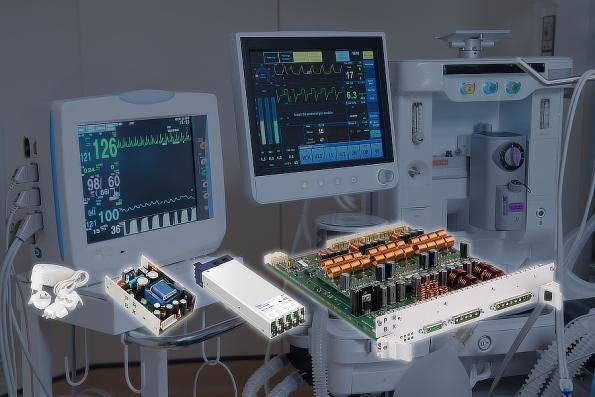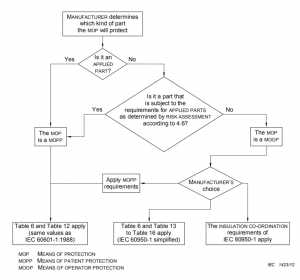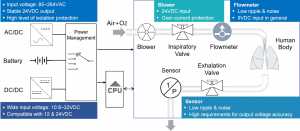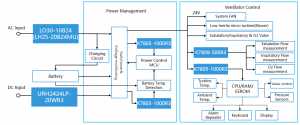Switching power supplies are widely used in medical devices, such as a ventilator, mask machine, PCR nucleic acid detector, body temperature detector, multi-parameter monitor, x ray, CT/PET, blood analyzer, heart-lung machines, and diagnostic devices, etc. X ray machine power supply is one of the most popular medical power supplies. Follow these tips to select the most suitable safe, low leakage current, reliable insulation, and good EMC performance power supplies for the ”heart” of the medical device.
Types of Medical Applications
Medical device not only needs to consider operator protection, such as doctor and nurse but also patient protection. The requirements of the operator and patient protection are different. Since the health state of a patient and operator is different and the patient normally is in a weaker state, thus a higher level of protection is required for the patient. The medical device is divided into three types (see below) according to the judgment that – whether the medical device is in electrical contact with the patient and how to contact the patient.
For those medical devices which do not have direct electrical contact with the patient (B type), it is only considered to provide operator
protection, thus such medical devices have lower requirements for power supplies. However, if the medical devices contact the patient’s heart (CF type), which is the most sensitive part of the human body, it is considered to provide the highest protection level for the patient, in that case, the medical devices have higher requirements for power supplies.
Tips for Selecting Power Supplies for Medical Applications
First of all, it is necessary to confirm if a medical device has an electrical contractor has the possibility to contact with the patient. If devices that are used in hospitals have direct electrical contact with patients, who in some cases are in a weak condition, even a small amount of leakage current can have negative effects on the patients. The leakage current of the power supply for the medical device must be limited to the lowest specified value. The medical device tends to be more sensitive to electromagnetic interference (EMI) than most of the industrial device. Therefore, the power supply for medical devices should meet more stringent EMI standards. The key of the power supply for medical device applications is the safety and reliable insulation between the input and output as any shortcoming in insulation would result in the risk of electric shock. The isolation voltage between the primary and secondary side of the transformer, safety distance (creepage and clearance) provide measures of insulation. Therefore, it is necessary to pay attention to leakage current, EMI, and reliable insulation when selecting a power supply for medical devices.
If the medical device is not likely to have electrical contact with the patient, it is enough to use a medical-grade or industrial grade power supply which is able to provide enough operator protection.
We can follow the following process to judge the requirements for switching power supply.
The above picture shows the means of protection (MOP), which includes insulation, air clearance, creepage distances, impedances, and protective earth connections. MOPP is means of patient protection, while MOOP is means of operator protection.
For BF/CF types of medical devices power supply need to meet 2x MOPP, while for B type medical devices, it is available to use a medical-grade power supply that meets 2x MOOP or industrial power supply.
Ventilator Application Analysis
A ventilator is a device that provides mechanical ventilation by moving breathable air into and out of the lungs, to deliver breaths to a patient who is physically unable to breathe, or breathing insufficiently. Severe patients with pneumonia usually use a ventilator during the treatment process, which is regarded as a life-saving straw and has become an indispensable medical device in clinical treatment. It is increasingly used in the fields of first aid, anesthesia, ICU, and respiratory therapy widely.
Ventilator application diagram is as below, it controls the air through the inspiratory valve and exhalation valve, and in the meantime detects airflow, pressure, oxygen density, etc. in order to give an alarm in time when the patient is in abnormal breathing.
Ventilator Power Supply Requirements
The power system of the ventilator includes mains AC/DC power supply, DC/DC power supply, and internal backup batteries. A reliable and safe power system is one of the most important parts of a ventilator to ensure the ventilator works stably, reliably, and safely. Below is the analysis of the ventilator’s power supply requirements.
For mains AC/DC power supply, it must meet universal input voltage range from 85Vac to 264Vac to meet global common ventilator input demands, and provide stable 24Vdc output voltage with high accuracy. At the same time power supply has to be highly reliable whose EMI should comply with EN55011 (CISPR11) CLASS B, in order to avoid disturbance to other medical devices. It is available to use a medical-grade or industrial AC/DC power supply, all because the ventilator itself does not have electrical contact with the patient directly so that’s why an industrial AC/DC power supply is also available here.
For DC/DC power supply part, normally the input voltage range is wide from 10.8Vdc to 33Vdc which is compatible with 12Vdc and 24Vdc system. The backup batteries inside the ventilator are used to provide instant power for a ventilator so as to ensure it can work normally and continue to help the patient breathe in case that mains AC/DC power supply is not available when there is a power outage in hospital.
There are several sub-systems in the ventilator’s control system, such as blower, valve, flow meter, signal sampling, and fan, and all of them need a reliable power supply to ensure their reliable operation.
Blower requirements for power supply are: need 24Vdc input, perfect protections, for example, if the blower is stuck and stop working, this power supply’s output is cut off and turns into short circuit protection mode. In addition, when selecting a power supply, its output power should match the blower which is used in the ventilator, from 1A to 3A or greater.
Valve sub-system includes inspiratory valve, exhalation valve, and oxygen valve, and for these parts, non-isolated power supplies are available because front AC/DC or DC/DC power supply is already isolated.
The function of the flow meter is to detect a patient’s breath. The signal sampling system includes temperature sensors and pressure sensors etc. They both require a power supply with high output voltage accuracy and low ripple and noise. Non-isolated DC/DC power supply can be available here but if there is a greater disturbance in the system it is better to use an isolated power supply.
The fan in the system does not have strict requirements for the power supply, generally, a 5W non-isolated power supply is available for this part.
Power Solutions for Ventilator
According to the above power, supply demands,MORNSUN comes up with its reliable and safe power solutions available on a short lead-times. The power solutions diagram is as below.
MORNSUN is able to provide medical AC/DC power converter LH25-20B24MU, which features universal input voltage range from 85Vac to 264Vac, low power consumption, high efficiency, high reliability, and low ripple and noise. This product’s isolation voltage is up to 4000Vac, complies with IEC60601-1, EN60601-1, ANSI/AAMI ES60601-1, CAN/CSA-C22.2 No. 60601-1 approval (2xMOPP), EMI complies to EN55011(CISPR11) CLASS B, which is widely used in medical ventilators.
Considering that the ventilator does not have electrical contact with the patient, industrial AC/DC power supply is also available for this part except medical grade power supply, so Mornsun’s other product LO30-10B24 is also recommended to use here. This product features universal input voltage range from 85Vac to 264Vac, good EMI performance, and it complies with IEC/EN61000-4, CISPR32/EN55032 Class B, UL/EN/IEC62368, and EN/UL60335 standards.
MORNSUN is able to provide medical DC/DC power converte URH2424LP-20WR3 which features 20W, wide input voltage range from 9-36Vdc, high efficiency to 89%, isolation voltage up to 5000Vac, over-voltage protection (OVP) and short-circuit protection (SCP). Besides, this product meets double patient protection (2x MOPP) and complies with EN60601-1, and its leakage current is lower than 5µA which makes it an ideal choice.











